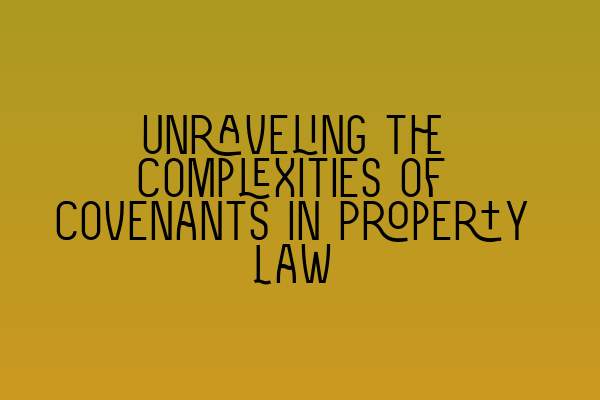Unraveling the Complexities of Covenants in Property Law
Property law is a vast and intricate field, encompassing various legal concepts and principles that govern the rights and obligations associated with real estate. One such fundamental aspect of property law is covenants. Covenants play a crucial role in property transactions, dictating the rights and obligations between parties involved. However, navigating through the complexities of covenants in property law can be daunting.
At SQE Property Law & Land Law, we understand the challenges that individuals and businesses face when dealing with covenants. That is why we have prepared this comprehensive guide to help unravel the complexities of covenants in property law, providing you with the information you need to navigate this intricate area of law confidently.
What are Covenants?
Covenants, in the context of property law, are legally binding agreements or promises that impose obligations or restrictions on the use and enjoyment of land. These obligations can be economic, such as paying fees or contributing to maintenance costs, or related to specific uses of the property, such as prohibiting certain activities.
There are two primary types of covenants:
- Positive Covenants: Positive covenants require a party to do something, such as maintaining a fence or contributing to the maintenance of shared amenities. These covenants often arise in the context of housing developments or shared ownership properties.
- Restrictive Covenants: Restrictive covenants, on the other hand, impose limitations or prohibitions on the use of land. Common examples include restrictions on building extensions or running a business from a residential property.
Both positive and restrictive covenants are typically attached to the property and bind subsequent owners, ensuring the continuity of obligations or restrictions.
The Importance of Covenants
Covenants serve several important purposes in property law. One key aspect is their role in upholding the integrity and value of properties within a development or area. Restrictive covenants, for instance, can prevent inappropriate development or activities that could impact the quality of life or property values in the vicinity.
Covenants can also facilitate the proper management and maintenance of communal areas or shared infrastructure in residential complexes or neighborhoods. Positive covenants, such as those requiring contributions to maintenance funds, ensure that everyone benefits equitably from shared resources.
Enforcing and Discharging Covenants
Enforcing covenants can be complex, as it often involves determining the intentions of the parties and interpreting the language used in the covenant agreement. Legal principles and case law play a significant role in interpreting covenants, and seeking professional legal advice is crucial when dealing with covenant disputes or breaches.
In some cases, covenants may become outdated or no longer serve their intended purpose. In such situations, it may be possible to discharge or modify the covenant through legal processes. This typically involves applying to the Upper Tribunal (Land Chamber) for a modification order or a discharge order.
It is important to note that discharging or modifying a covenant is not always straightforward and requires meeting specific legal requirements. Therefore, seeking legal advice from experienced property solicitors, such as those at SQE Property Law & Land Law, is essential to navigate these processes successfully.
Conclusion
Covenants are a vital aspect of property law, governing the rights and obligations associated with real estate. Understanding the complexities of covenants is crucial, whether you are buying or selling a property, managing a development, or dealing with a covenant dispute.
If you require legal advice or assistance regarding covenants or any other property law matter, the expert solicitors at SQE Property Law & Land Law are here to help. We specialize in property law and have extensive experience in dealing with covenants, ensuring that our clients receive the best possible guidance and representation.
Related Articles:
